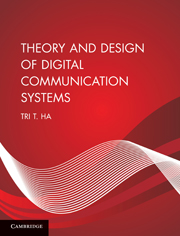Book contents
- Frontmatter
- Contents
- Preface
- Acknowledgements
- List of symbols
- List of abbreviations
- 1 Introduction
- 2 Deterministic signal analysis
- 3 Random signal analysis
- 4 Information theory and channel coding
- 5 Communication link analysis
- 6 Modulation
- 7 Demodulation
- 8 Spread spectrum
- 9 Intersymbol interference and equalization
- 10 Fading channels
- Index
- References
9 - Intersymbol interference and equalization
Published online by Cambridge University Press: 05 June 2012
- Frontmatter
- Contents
- Preface
- Acknowledgements
- List of symbols
- List of abbreviations
- 1 Introduction
- 2 Deterministic signal analysis
- 3 Random signal analysis
- 4 Information theory and channel coding
- 5 Communication link analysis
- 6 Modulation
- 7 Demodulation
- 8 Spread spectrum
- 9 Intersymbol interference and equalization
- 10 Fading channels
- Index
- References
Summary
Introduction
Intersymbol interference (ISI) is a phenomenon in which the energy of a symbol spills over into succeeding symbols causing interference. Tight filtering at the transmitter and receiver and/or channel distortion can cause the waveform that represents a symbol to spread out into succeeding symbol periods. In a terrestrial wireless channel, a signal can travel from the transmitter to the receiver via multiple delayed paths (echoes). If the delays between paths are large compared to a symbol period, the energy carried by these echoes can cause significant ISI to the succeeding symbols. In this chapter, we study the Nyquist criterion for zero ISI and provide the design of an optimum demodulator that can achieve both maximum output signal-to-noise ratio and zero ISI. We then study linear equalizers, such as the zero-forcing linear equalizer (ZF-LE), and the mean-square error linear equalizer (MSE-LE), and nonlinear equalizers, such as the zero-forcing decision-feedback equalizer (ZF-DFE) and the mean-square error decision-feedback equalizer (MSE-DFE). Both nonlinear equalizers perform better than their linear counterparts. We then study the maximum likelihood sequence detection (MLSD), which is the optimum nonlinear equalization technique. Finally, the fractionally spaced equalizer is introduced to solve the timing error problem in the previous equalizers.
Information
- Type
- Chapter
- Information
- Theory and Design of Digital Communication Systems , pp. 473 - 521Publisher: Cambridge University PressPrint publication year: 2010
References
Accessibility standard: Unknown
Why this information is here
This section outlines the accessibility features of this content - including support for screen readers, full keyboard navigation and high-contrast display options. This may not be relevant for you.Accessibility Information
- 1
- Cited by
